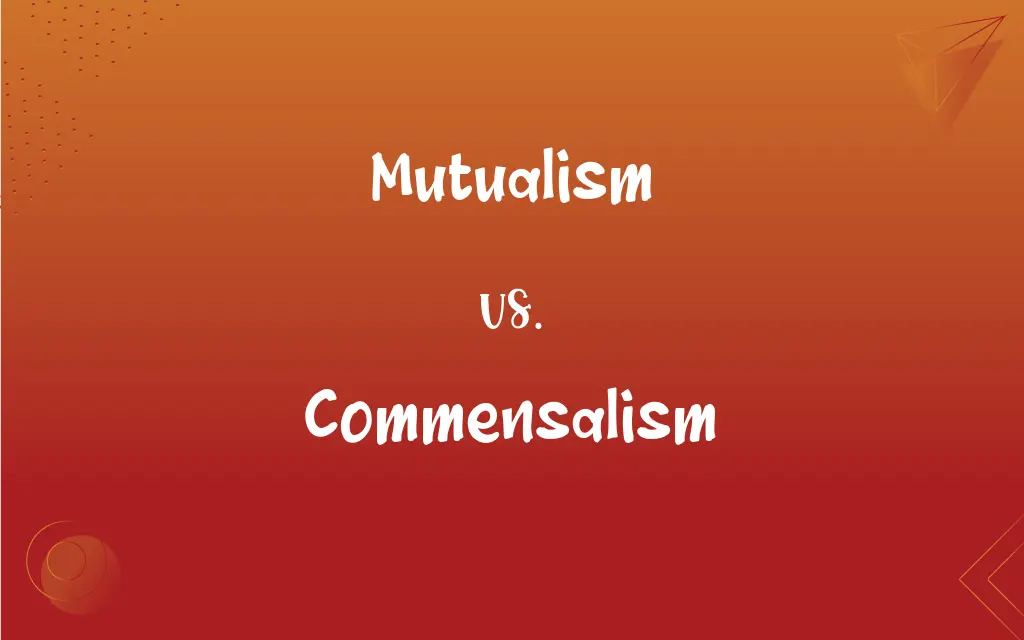Mutualism vs. Commensalism: What's the Difference?
Edited by Janet White || By Harlon Moss || Updated on October 27, 2023
Mutualism is a symbiotic relationship where both parties benefit. Commensalism is a relationship where one party benefits without harming or helping the other.

Key Differences
Mutualism involves two species interacting in a way that benefits both. Commensalism benefits one species without affecting the other.
In mutualism, the relationship is often essential for survival. In commensalism, the benefiting species could survive without the relationship.
Examples of mutualism include bees pollinating flowers. Commensalism is exemplified by barnacles on whales.
Mutualism often involves active cooperation. Commensalism is more about one species taking advantage of the other's presence.
Mutualistic relationships can evolve into dependence. Commensal relationships rarely evolve into essential dependencies.
ADVERTISEMENT
Comparison Chart
Benefit
Both parties benefit.
One benefits, the other is unaffected.
Dependency
Often essential for both.
Not essential for either.
Example
Bees and flowers.
Barnacles on whales.
Nature of Interaction
Active cooperation.
Passive association.
Evolution
Can evolve into dependence.
Rarely evolves into dependence.
ADVERTISEMENT
Mutualism and Commensalism Definitions
Mutualism
Mutualism is a symbiotic relationship where both species benefit.
The mutualism between clownfish and sea anemones protects and feeds both.
Commensalism
Commensalism refers to a biological interaction where one party gains, and the other neither benefits nor suffers.
The commensalism of small fish using larger fish for protection is harmless to the larger fish.
Mutualism
Mutualism is a biological interaction with mutual benefits.
The mutualism between humans and gut bacteria aids digestion.
Commensalism
Commensalism is a relationship where one species benefits, and the other is unaffected.
The commensalism of remoras riding sharks benefits remoras without affecting sharks.
Mutualism
Mutualism refers to a cooperative interaction between two different species.
The mutualism of legumes and nitrogen-fixing bacteria enriches soil fertility.
Commensalism
Commensalism involves one organism benefiting from another without harming it.
The commensalism of birds nesting in trees provides shelter without harming the trees.
Mutualism
Mutualism is a symbiosis where both organisms gain advantages.
The mutualism of fungi and algae in lichens benefits both in harsh environments.
Commensalism
Commensalism is a relationship where one species benefits from another's existence.
The commensalism of certain birds eating insects stirred up by grazing animals benefits the birds.
Mutualism
Mutualism involves two species both deriving benefits from their relationship.
The mutualism of flowering plants and pollinators ensures reproduction.
Commensalism
Commensalism is a symbiotic relationship with one-sided benefits.
The commensalism of epiphytic plants on trees benefits plants without affecting trees.
Mutualism
An association between two organisms of different species in which each member benefits.
Commensalism
A symbiotic relationship between two organisms of different species in which one derives some benefit while the other is unaffected.
Mutualism
(ecology) Any interaction between two species that benefits both; typically involves the exchange of substances or services.
Commensalism
(ecology) A sharing of the same environment by two organisms where one species benefits and the other is unaffected. An example is barnacles on whales.
Mutualism
An economic theory and anarchist school of thought that advocates a society where each person might possess a means of production, either individually or collectively, with trade representing equivalent amounts of labor in the free market.
Commensalism
The act of eating together; table fellowship.
Mutualism
The doctrine of mutual dependence as the condition of individual and social welfare.
Commensalism
The act of eating together; table fellowship.
Mutualism
The relation between two different species of organisms that are interdependent; each gains benefits from the other
Commensalism
The relation between two different kinds of organisms when one receives benefits from the other without damaging it
FAQs
Can mutualism be obligatory?
Yes, some mutualistic relationships are essential for survival.
Are commensal relationships harmful?
No, they don't harm the unaffected party.
Can mutualism evolve into dependency?
Yes, some mutualistic relationships can become essential.
What is mutualism?
Mutualism is a relationship where both species benefit.
What is commensalism?
Commensalism is when one species benefits, and the other is unaffected.
Can mutualism turn into parasitism?
Rarely, but the balance can shift under certain conditions.
Is mutualism important for biodiversity?
Yes, it plays a crucial role in many ecosystems.
Do mutualistic relationships require close proximity?
Often, but not always.
Is commensalism less common than mutualism?
Not necessarily, both are common in nature.
Are mutualistic relationships always beneficial?
In general, yes, but complexities can arise.
Are commensal relationships always static?
They can evolve over time, sometimes into mutualism or parasitism.
Are all mutualistic relationships between animals?
No, they can also occur between plants, fungi, and bacteria.
Can mutualism affect ecosystems?
Yes, it can significantly impact ecological balance.
Can commensalism occur in aquatic environments?
Yes, it's common in both aquatic and terrestrial environments.
Can commensal species switch to other hosts?
Yes, if opportunities arise.
Are commensal species always smaller?
Typically, but not necessarily.
Do all commensal relationships involve physical contact?
Not always, some involve spatial or food-related benefits.
Can human activities disrupt commensal relationships?
Yes, habitat changes can impact commensal species.
Do mutualistic relationships require active cooperation?
Typically, they involve some level of cooperation.
Do commensal species depend on their hosts?
No, they benefit but don't depend on them.
About Author
Written by
Harlon MossHarlon is a seasoned quality moderator and accomplished content writer for Difference Wiki. An alumnus of the prestigious University of California, he earned his degree in Computer Science. Leveraging his academic background, Harlon brings a meticulous and informed perspective to his work, ensuring content accuracy and excellence.
Edited by
Janet WhiteJanet White has been an esteemed writer and blogger for Difference Wiki. Holding a Master's degree in Science and Medical Journalism from the prestigious Boston University, she has consistently demonstrated her expertise and passion for her field. When she's not immersed in her work, Janet relishes her time exercising, delving into a good book, and cherishing moments with friends and family.































































